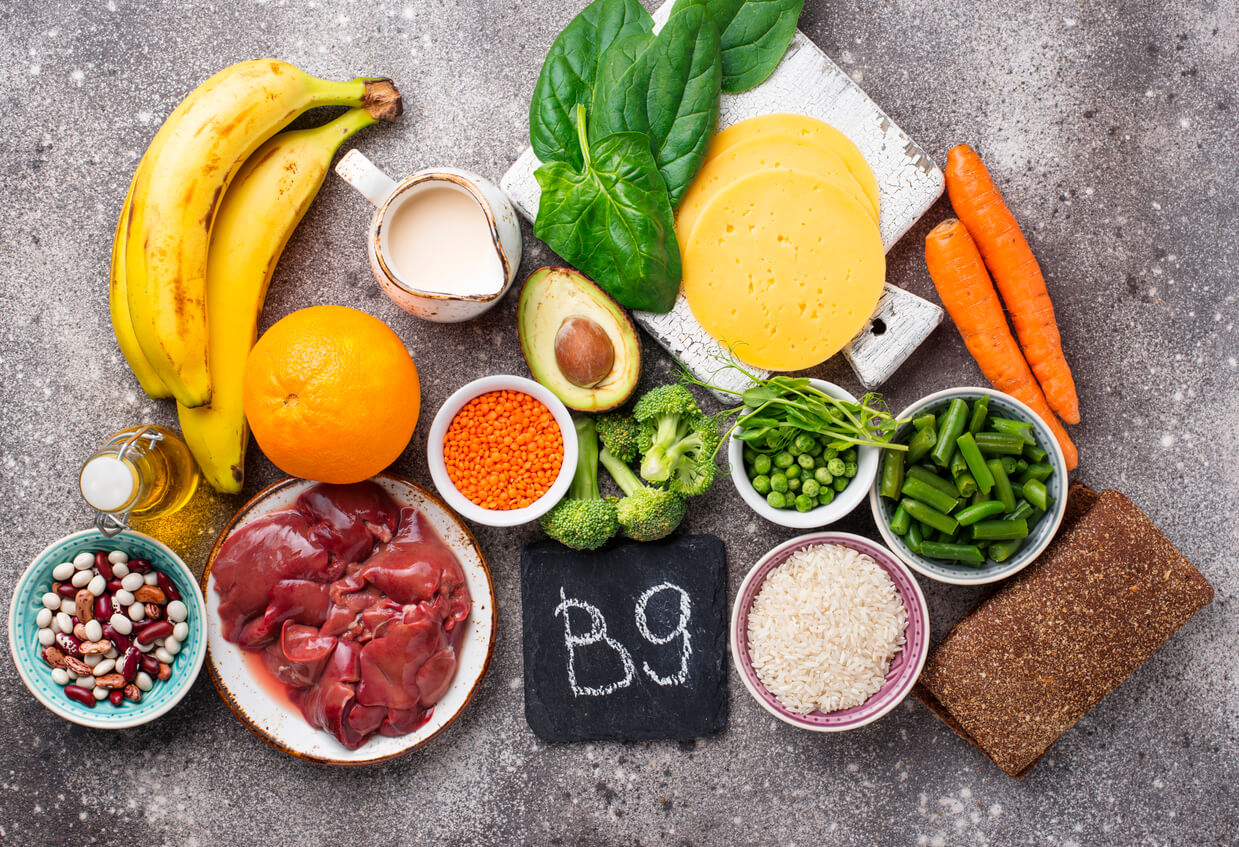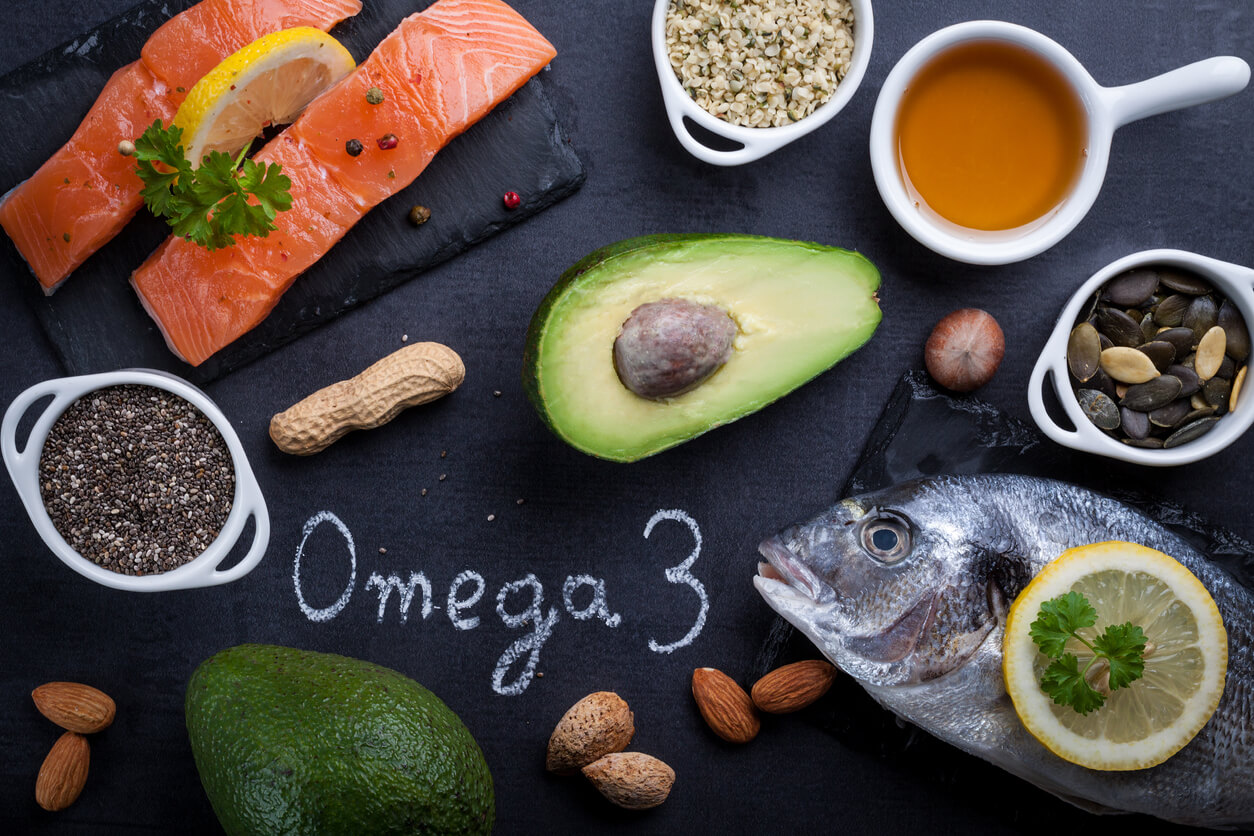The 3 Essential Nutrients, Vitamins, and Minerals During Pregnancy

There are a series of essential nutrients, vitamins, and minerals during pregnancy whose daily intake becomes transcendental in order to ensure the proper development of the fetus. Otherwise, the future baby could experience serious health problems that could condition its wellbeing. Optimizing your diet during the gestation stage will be key to avoiding diseases in the future.
Before starting, it should be noted that, just as the consumption of certain nutrients should be emphasized, it will be crucial to avoid the presence of toxins in the diet. Both alcohol and tobacco should be prohibited, as they cause a series of serious side effects. Other healthy lifestyle habits should also be promoted.
The 3 essential nutrients, vitamins, and minerals during pregnancy
1. Folic acid, an essential vitamin during pregnancy
The first nutrient we’re going to discuss is folic acid. It’s a vitamin of the B group that’s found in several foods, such as legumes and spinach. Although its requirements are easily met, during pregnancy, they’re significantly increased. For this reason, it’s usually supplemented, as evidenced by a study published in the journal Annals D’Endocrinologie.
If folic acid deficiency is experienced during pregnancy, this may lead to a problem related to the closure of the neural tube of the fetus, which will cause alterations in the child’s welfare. For that reason, and in spite of emphasizing the presence in the diet of foods with this vitamin, an extra contribution of folic acid is recommended.

2. Iron in pregnancy to prevent anemia
As the gestation period progresses, the volume of blood in the woman’s body begins to increase. As a result, dietary iron requirements also increase. This mineral is essential to ensure the transport of oxygen through the blood. In fact, an inadequate supply leads to anemia, according to research published in the journal The Medical Clinics of North America.
Interestingly, the absorption of dietary iron is very poor. At best, 15 to 20% of the total amount consumed is used by the body, which is very little. Furthermore, we’re talking about a situation in which the mineral from animal foods is administered together with a dose of vitamin C and without fiber in the food.
For this reason, it’s usually best to also prescribe an iron supplement together with folic acid. This prevents anemia that could cause extreme fatigue in pregnant women, which would have a negative impact on their routines. However, the product must be consumed correctly. It’s important to note that fiber decreases its absorption.
3. Omega 3, one of the fundamental nutrients for neurological development
Increasing the dietary intake of omega 3 is one of the priorities at any stage of life, at least under current dietary approaches. However, it becomes even more transcendental in the case of pregnancy, as this nutrient is related to the good neurological development of the fetus.
It’s an element that contributes to optimizing the inflammatory mechanisms inside the human body. It avoids problems related to the cardiovascular system and also reduces the incidence of autoimmune diseases such as asthma.
In the event that the daily requirements aren’t met, it’s a good strategy to supplement. There are several fish oil products on the market that have good quality and concentrate large amounts of this nutrient.

Pay attention to essential nutrients, vitamins, and minerals during pregnancy
As mentioned above, there are several nutrients whose consumption in sufficient quantities could determine the health of the mother and fetus during pregnancy. Sometimes, it’s not easy to meet the requirements through a woman’s diet, so resorting to dietary supplements will be necessary.
However, before opting for this alternative, it would be advisable to visit a nutrition specialist. It’s not only enough to guarantee an extra supply, but it will be decisive to optimize your daily diet to achieve a balanced situation in the internal environment of your body. Thanks to this, the correct development of your baby will be favored in the future.
There are a series of essential nutrients, vitamins, and minerals during pregnancy whose daily intake becomes transcendental in order to ensure the proper development of the fetus. Otherwise, the future baby could experience serious health problems that could condition its wellbeing. Optimizing your diet during the gestation stage will be key to avoiding diseases in the future.
Before starting, it should be noted that, just as the consumption of certain nutrients should be emphasized, it will be crucial to avoid the presence of toxins in the diet. Both alcohol and tobacco should be prohibited, as they cause a series of serious side effects. Other healthy lifestyle habits should also be promoted.
The 3 essential nutrients, vitamins, and minerals during pregnancy
1. Folic acid, an essential vitamin during pregnancy
The first nutrient we’re going to discuss is folic acid. It’s a vitamin of the B group that’s found in several foods, such as legumes and spinach. Although its requirements are easily met, during pregnancy, they’re significantly increased. For this reason, it’s usually supplemented, as evidenced by a study published in the journal Annals D’Endocrinologie.
If folic acid deficiency is experienced during pregnancy, this may lead to a problem related to the closure of the neural tube of the fetus, which will cause alterations in the child’s welfare. For that reason, and in spite of emphasizing the presence in the diet of foods with this vitamin, an extra contribution of folic acid is recommended.

2. Iron in pregnancy to prevent anemia
As the gestation period progresses, the volume of blood in the woman’s body begins to increase. As a result, dietary iron requirements also increase. This mineral is essential to ensure the transport of oxygen through the blood. In fact, an inadequate supply leads to anemia, according to research published in the journal The Medical Clinics of North America.
Interestingly, the absorption of dietary iron is very poor. At best, 15 to 20% of the total amount consumed is used by the body, which is very little. Furthermore, we’re talking about a situation in which the mineral from animal foods is administered together with a dose of vitamin C and without fiber in the food.
For this reason, it’s usually best to also prescribe an iron supplement together with folic acid. This prevents anemia that could cause extreme fatigue in pregnant women, which would have a negative impact on their routines. However, the product must be consumed correctly. It’s important to note that fiber decreases its absorption.
3. Omega 3, one of the fundamental nutrients for neurological development
Increasing the dietary intake of omega 3 is one of the priorities at any stage of life, at least under current dietary approaches. However, it becomes even more transcendental in the case of pregnancy, as this nutrient is related to the good neurological development of the fetus.
It’s an element that contributes to optimizing the inflammatory mechanisms inside the human body. It avoids problems related to the cardiovascular system and also reduces the incidence of autoimmune diseases such as asthma.
In the event that the daily requirements aren’t met, it’s a good strategy to supplement. There are several fish oil products on the market that have good quality and concentrate large amounts of this nutrient.

Pay attention to essential nutrients, vitamins, and minerals during pregnancy
As mentioned above, there are several nutrients whose consumption in sufficient quantities could determine the health of the mother and fetus during pregnancy. Sometimes, it’s not easy to meet the requirements through a woman’s diet, so resorting to dietary supplements will be necessary.
However, before opting for this alternative, it would be advisable to visit a nutrition specialist. It’s not only enough to guarantee an extra supply, but it will be decisive to optimize your daily diet to achieve a balanced situation in the internal environment of your body. Thanks to this, the correct development of your baby will be favored in the future.
All cited sources were thoroughly reviewed by our team to ensure their quality, reliability, currency, and validity. The bibliography of this article was considered reliable and of academic or scientific accuracy.
- Valentin, M., Coste Mazeau, P., Zerah, M., Ceccaldi, P. F., Benachi, A., & Luton, D. (2018). Acid folic and pregnancy: A mandatory supplementation. Annales d’endocrinologie, 79(2), 91–94. https://doi.org/10.1016/j.ando.2017.10.001
- DeLoughery T. G. (2017). Iron Deficiency Anemia. The Medical clinics of North America, 101(2), 319–332. https://doi.org/10.1016/j.mcna.2016.09.004
This text is provided for informational purposes only and does not replace consultation with a professional. If in doubt, consult your specialist.








